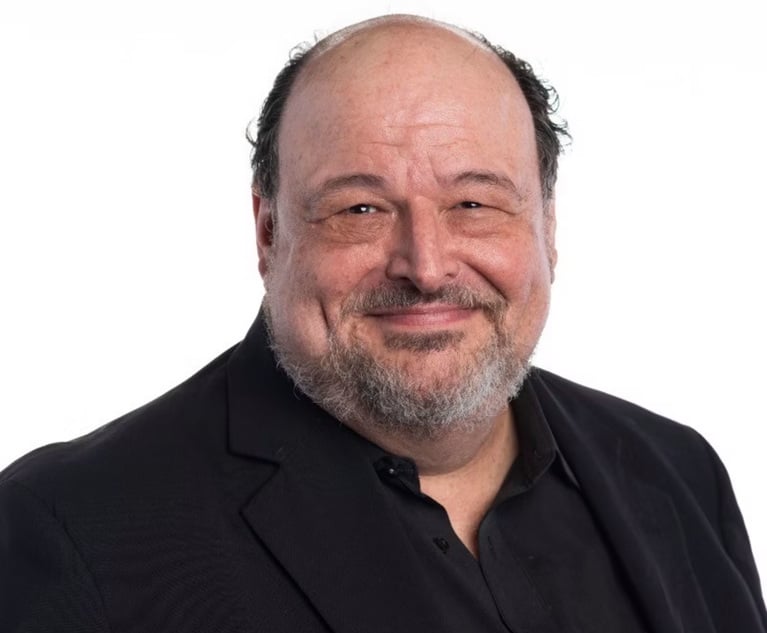IP: The confusing intersection of trademarks and search engine optimization
Last December, a Superior Court for the Commonwealth of Massachusetts, an educational software company, the Tiananmen Square student protests and a documentary film company converged on the Internet.
January 17, 2012 at 07:28 AM
7 minute read
The original version of this story was published on Law.com
Last December, a Superior Court for the Commonwealth of Massachusetts, an educational software company, the Tiananmen Square student protests and a documentary film company converged on the Internet. The Boston Patent Law Association (BPLA) weighed in by filing an amicus brief, drafted by attorneys at Wolf, Greenfield & Sacks, P.C., urging the appeals court to protect Internet users.
This suit arises out of a dispute between Jenzabar, a company owned in part by Chai Ling, who figured prominently as a student organizer during the Tiananmen Square protests, and the Long Bow Group, which produces documentary films. The Long Bow Group produced one film in particular that focused on the student protests in China at the end of the 1980s.
According to Jenzabar, the Long Bow Group used search engine optimization (SEO) to cause a link to appear near the top of search results triggered by a search for “Jenzabar.” This link featured a title tag comprised entirely of “Jenzabar” and accompanying text that, in the BPLA's view, did nothing to tell Internet users that it was not an official Jenzabar website. Although Chai Ling appeared in the film several times, a search of the transcript reveals that Jenzabar was never mentioned.
In the Superior Court's Dec. 7, 2010 order in favor of the Long Bow Group, the first sentence stated “[t]his action arises from a dispute between the plaintiffs and defendant over content on the [Long Bow Group's] web site” (emphasis added). In the BPLA's estimation, this mischaracterization of the case overshadowed the Superior Court's decision and threatened the usability of the Internet. The court seemingly viewed this as an attempt by Jenzabar to censor the defendant and so gave short shrift to the allegation that the defendant used Jenzabar's trademark to trick consumers into viewing that content.
While the BPLA took no position as to whether there was infringement in this case, it urged the court to recognize that trademark law does not countenance the use of a trademark to divert Internet users to a website. This is true regardless of whether the party doing the tricking competes with the trademark holder or if there is a commercial motive at all. Whether Internet users would be confused once they landed on the trickster's website is also of no consequence in this context.
The analogy frequently employed to defend the use of a trademark that triggers links to unaffiliated websites in online search results is that such use recreates in the digital world the experience of walking down a grocery store aisle. Consumers looking for mustard would see all available mustard brands even if they went to the aisle specifically for Grey Poupon.
But this analogy holds true only so long as the mustard brands are not confusingly labeled. If a consumer could only determine which brand was which by removing it from the shelf, the experience of grocery shopping would be frustrating at best. In its brief, the BPLA took the position that using a trademark to trigger links in search results is acceptable, but only so long as the links that are triggered are not confusing. This would protect Internet users from searches that are littered with confusing results, while allowing competitors and activists to make non-infringing use of trademarks that promote competition and free speech.
The Long Bow Group is expected to file its brief with the Commonwealth of Massachusetts Appeals Court within the week. Additionally, the Berkman Center for Internet and Society at Harvard University has also sought leave to file an amicus curiae brief in this case.
Last December, a Superior Court for the Commonwealth of
This suit arises out of a dispute between Jenzabar, a company owned in part by Chai Ling, who figured prominently as a student organizer during the Tiananmen Square protests, and the Long Bow Group, which produces documentary films. The Long Bow Group produced one film in particular that focused on the student protests in China at the end of the 1980s.
According to Jenzabar, the Long Bow Group used search engine optimization (SEO) to cause a link to appear near the top of search results triggered by a search for “Jenzabar.” This link featured a title tag comprised entirely of “Jenzabar” and accompanying text that, in the BPLA's view, did nothing to tell Internet users that it was not an official Jenzabar website. Although Chai Ling appeared in the film several times, a search of the transcript reveals that Jenzabar was never mentioned.
In the Superior Court's Dec. 7, 2010 order in favor of the Long Bow Group, the first sentence stated “[t]his action arises from a dispute between the plaintiffs and defendant over content on the [Long Bow Group's] web site” (emphasis added). In the BPLA's estimation, this mischaracterization of the case overshadowed the Superior Court's decision and threatened the usability of the Internet. The court seemingly viewed this as an attempt by Jenzabar to censor the defendant and so gave short shrift to the allegation that the defendant used Jenzabar's trademark to trick consumers into viewing that content.
While the BPLA took no position as to whether there was infringement in this case, it urged the court to recognize that trademark law does not countenance the use of a trademark to divert Internet users to a website. This is true regardless of whether the party doing the tricking competes with the trademark holder or if there is a commercial motive at all. Whether Internet users would be confused once they landed on the trickster's website is also of no consequence in this context.
The analogy frequently employed to defend the use of a trademark that triggers links to unaffiliated websites in online search results is that such use recreates in the digital world the experience of walking down a grocery store aisle. Consumers looking for mustard would see all available mustard brands even if they went to the aisle specifically for Grey Poupon.
But this analogy holds true only so long as the mustard brands are not confusingly labeled. If a consumer could only determine which brand was which by removing it from the shelf, the experience of grocery shopping would be frustrating at best. In its brief, the BPLA took the position that using a trademark to trigger links in search results is acceptable, but only so long as the links that are triggered are not confusing. This would protect Internet users from searches that are littered with confusing results, while allowing competitors and activists to make non-infringing use of trademarks that promote competition and free speech.
The Long Bow Group is expected to file its brief with the Commonwealth of
This content has been archived. It is available through our partners, LexisNexis® and Bloomberg Law.
To view this content, please continue to their sites.
Not a Lexis Subscriber?
Subscribe Now
Not a Bloomberg Law Subscriber?
Subscribe Now
NOT FOR REPRINT
© 2024 ALM Global, LLC, All Rights Reserved. Request academic re-use from www.copyright.com. All other uses, submit a request to [email protected]. For more information visit Asset & Logo Licensing.
You Might Like
View All
'The Show Must Go On': Solo-GC-of-Year Kevin Colby Pulls Off Perpetual Juggling Act

Contract Software Unicorn Ironclad Hires Former Pinterest Lawyer as GC
2 minute read
How Amy Harris Leverages Diversity to Give UMB Financial a Competitive Edge
5 minute read
Auditor Finds 'Significant Deficiency' in FTC Accounting to Tune of $7M
4 minute readTrending Stories
- 1Gibson Dunn Sued By Crypto Client After Lateral Hire Causes Conflict of Interest
- 2Trump's Solicitor General Expected to 'Flip' Prelogar's Positions at Supreme Court
- 3Pharmacy Lawyers See Promise in NY Regulator's Curbs on PBM Industry
- 4Outgoing USPTO Director Kathi Vidal: ‘We All Want the Country to Be in a Better Place’
- 5Supreme Court Will Review Constitutionality Of FCC's Universal Service Fund
Who Got The Work
Michael G. Bongiorno, Andrew Scott Dulberg and Elizabeth E. Driscoll from Wilmer Cutler Pickering Hale and Dorr have stepped in to represent Symbotic Inc., an A.I.-enabled technology platform that focuses on increasing supply chain efficiency, and other defendants in a pending shareholder derivative lawsuit. The case, filed Oct. 2 in Massachusetts District Court by the Brown Law Firm on behalf of Stephen Austen, accuses certain officers and directors of misleading investors in regard to Symbotic's potential for margin growth by failing to disclose that the company was not equipped to timely deploy its systems or manage expenses through project delays. The case, assigned to U.S. District Judge Nathaniel M. Gorton, is 1:24-cv-12522, Austen v. Cohen et al.
Who Got The Work
Edmund Polubinski and Marie Killmond of Davis Polk & Wardwell have entered appearances for data platform software development company MongoDB and other defendants in a pending shareholder derivative lawsuit. The action, filed Oct. 7 in New York Southern District Court by the Brown Law Firm, accuses the company's directors and/or officers of falsely expressing confidence in the company’s restructuring of its sales incentive plan and downplaying the severity of decreases in its upfront commitments. The case is 1:24-cv-07594, Roy v. Ittycheria et al.
Who Got The Work
Amy O. Bruchs and Kurt F. Ellison of Michael Best & Friedrich have entered appearances for Epic Systems Corp. in a pending employment discrimination lawsuit. The suit was filed Sept. 7 in Wisconsin Western District Court by Levine Eisberner LLC and Siri & Glimstad on behalf of a project manager who claims that he was wrongfully terminated after applying for a religious exemption to the defendant's COVID-19 vaccine mandate. The case, assigned to U.S. Magistrate Judge Anita Marie Boor, is 3:24-cv-00630, Secker, Nathan v. Epic Systems Corporation.
Who Got The Work
David X. Sullivan, Thomas J. Finn and Gregory A. Hall from McCarter & English have entered appearances for Sunrun Installation Services in a pending civil rights lawsuit. The complaint was filed Sept. 4 in Connecticut District Court by attorney Robert M. Berke on behalf of former employee George Edward Steins, who was arrested and charged with employing an unregistered home improvement salesperson. The complaint alleges that had Sunrun informed the Connecticut Department of Consumer Protection that the plaintiff's employment had ended in 2017 and that he no longer held Sunrun's home improvement contractor license, he would not have been hit with charges, which were dismissed in May 2024. The case, assigned to U.S. District Judge Jeffrey A. Meyer, is 3:24-cv-01423, Steins v. Sunrun, Inc. et al.
Who Got The Work
Greenberg Traurig shareholder Joshua L. Raskin has entered an appearance for boohoo.com UK Ltd. in a pending patent infringement lawsuit. The suit, filed Sept. 3 in Texas Eastern District Court by Rozier Hardt McDonough on behalf of Alto Dynamics, asserts five patents related to an online shopping platform. The case, assigned to U.S. District Judge Rodney Gilstrap, is 2:24-cv-00719, Alto Dynamics, LLC v. boohoo.com UK Limited.
Featured Firms
Law Offices of Gary Martin Hays & Associates, P.C.
(470) 294-1674
Law Offices of Mark E. Salomone
(857) 444-6468
Smith & Hassler
(713) 739-1250






